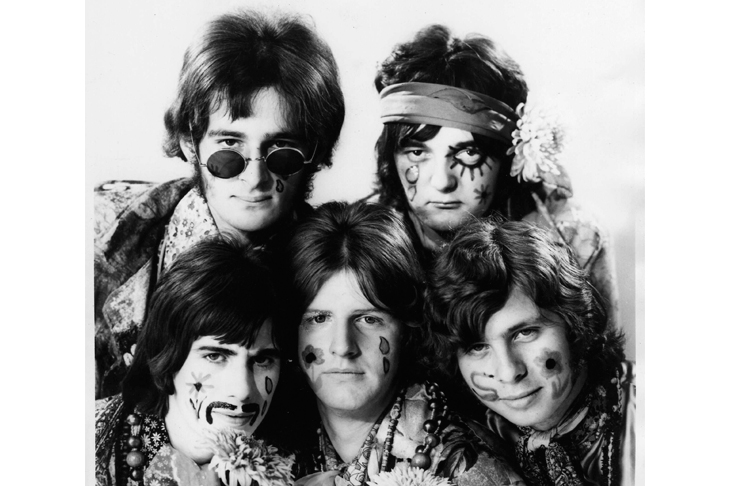Pop’s counterfactuals tend to be built on questioning mortality: what if Jimi Hendrix had lived? Or Buddy Holly? Rarely does geopolitics enter into the speculation. Nevertheless, there’s a case for arguing that the landscape of British pop would have been markedly different had Harold Wilson acceded to the wishes of President Lyndon Johnson and sent British forces to Vietnam.
That’s worth contemplating now, ahead of the latest reissue — deluxe and expanded and remastered, as these things always are — of Sgt. Pepper’s Lonely Hearts Club Band, released last week for the 50th anniversary of the original album. The Beatles — along with Pink Floyd, who were recording The Piper at the Gates of Dawn in the adjoining Abbey Road studio — more or less determined the parameters of English psychedelia, shaping it in a way that was markedly different from what was happening on the other side of the Atlantic.
American psychedelic music was facing up to the death of young men. Vietnam hung over the music, in the anger of the Doors and Love and Jefferson Airplane; in the lyrics of songs like the Byrds’ ‘Draft Morning’. In the UK, things were different. Where American artists called for an end to war, British artists — with no fear their friends might end up being killed — barely got past calling for an end to tea.
Just as the Beatles were at the heart of all of British pop’s other 1960s leaps and bounds, so they were at the heart of this. With ‘Yellow Submarine’, on the 1966 album Revolver, and ‘Lucy in the Sky with Diamonds’ on Sgt. Pepper, they more or less invented a style that became known to music nerds as ‘toytown pop’, in which musicians responded to LSD by opening their minds not to the possibilities of higher consciousness, but to nursery rhymes and doggerel. Or, as the Beatles did on the cover of Sgt. Pepper, by dressing themselves up as toy soldiers.
When people talk about Sgt. Pepper these days, it’s to ponder the groundbreaking nature of its recording, or how it consolidated the album as a creative format. It’s rarely to consider how, for two or three years, scores of English groups seized upon the daydreaming of ‘Lucy in the Sky with Diamonds’ and treated it as a manifesto.
You might think the shortcomings of pretending to be children would have been evident to musicians, but no. British pop in the 1960s was nothing if not opportunistic, as labels, producers and artists alike sought to capitalise on the latest trend. And this one appeared to have legs — no matter that hindsight tells us otherwise — not least because the contributory elements of toytown pop were abroad in areas other than music. Over Christmas 1966, one of the BBC’s big holiday productions had been Jonathan Miller’s TV adaptation of Alice in Wonderland. Lewis Carroll — and Edward Lear — were hugely influential on music in the late 1960s, not just on John Lennon, but also on Syd Barrett of Pink Floyd and dozens of others.
And so British pop fell into line. One of the more amusing elements was the number of groups turning from the tough R&B they’d been playing on the club circuit for the previous few years to childlike whimsy. Contemporary photos of these groups routinely depict men who look distinctly unsure of their new sartorial direction, like brickies in Laura Ashley, with at least one member clearly wishing he could be at the working men’s club supping a pint of mild.
The Alan Bown Set, one of many jobbing groups covering American soul, suddenly became The Alan Bown! and recorded an album that opened with a song called ‘Toyland’. The Spectres metamorphosed into the Status Quo, and made a debut album of tracks with such period titles as ‘Sunny Cellophane Skies’. Pirate radio DJ and future comedy star Kenny Everett recorded ‘And Now for a Little Train Number’, an orchestral reverie, with a typically blank psychedelic vocal, about trainspotting at a Birmingham station. Even dear old Marty Wilde got in on the act, putting his past as a watered-down Brit rock’n’roller behind him to record his extraordinary account of the life of a circus clown, ‘Zobo (1871–1892)’. Go online, and you can find hours of this stuff, resurfacing thanks to aficionados.
Sadly, toytown pop did not prove to be Sgt. Pepper’s enduring legacy. After a couple of years of candy-sweet confections, the serious musicians got the upper hand, and brought the other part of it to the fore, the concept album part. Progressive rock was born, no less silly in its own way than toytown pop, but an awful lot less fun.
So let’s celebrate Sgt. Pepper not with po-faced contemplation, but by picturing ourselves in a boat on a river. And let the trees be tangerine and the skies marmalade. And if the rocking horse people want to know what’s for dinner, tell them we’ve got marshmallow pies.






Comments